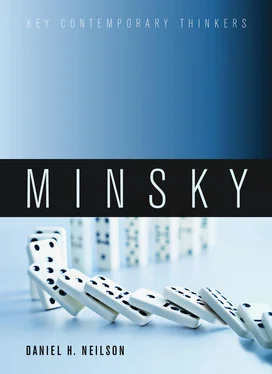ISBN-13: 978-1-5095-2849-3
ISBN-13: 978-1-5095-2850-9 (pb)
A catalogue record for this book is available from the British Library.
Typeset in 10.5 on 12pt Palatino
by Fakenham Prepress Solutions, Fakenham, Norfolk NR21 8NL
Printed and bound in the UK by TJ International Limited
The publisher has used its best endeavours to ensure that the URLs for external websites referred to in this book are correct and active at the time of going to press. However, the publisher has no responsibility for the websites and can make no guarantee that a site will remain live or that the content is or will remain appropriate.
Every effort has been made to trace all copyright holders, but if any have been overlooked the publisher will be pleased to include any necessary credits in any subsequent reprint or edition.
For further information on Polity, visit our website: politybooks.com
To my parents
I am deeply appreciative of the support of Diana DePardo-Minsky, Alan Minsky, and Esther Minsky in producing this book. My debts to Perry Mehrling, beyond the many citations in the pages that follow, cannot be listed exhaustively. I will mention only two: thank you for showing me Minsky, and thank you for teaching me how to be an economist (though I do it differently than you!). I have been enjoying conversations on all subjects with Tyler Bickford, Çağlar Girit, and Jackson Jones for decades now, and perhaps they will find some of those ideas reflected in these pages. Chris Coggins has been an inspiring co-teacher and friend. I thank Asma Abbas, who among many other lessons pointed me to Rancière (1987), where I found Jacotot (1823), which has been indispensable. An anonymous conversant helped me learn to navigate with map and compass. Whitney Harris was a dedicated research assistant and an indulgent counterparty in conversation and study. I am grateful to my students, and in particular to Jacques Ben-Avie, Mario Campbell, Mackenzie Dwyer, Darcy Pollard, Alice Sinclair, Jeff Tsen, John Zhang, and Chandler Zincke-Byer, each of whom taught me something during this project – thank you, it is what sustains me as a teacher.
I am grateful for and humbled by the work of three anonymous reviewers who read a quite rough version of the manuscript. I responded to many if not most of their suggestions in the text, sometimes by clarification rather than a change in course. I am likewise grateful for the editorial interventions of George Owers and Fiona Sewell at various stages of the process. The book is undoubtedly improved by all of these contributions, though I take responsibility for what remains.
Lena and Augie, I am inspired by how you love your work, and from you I am learning to love my own. Sara, you are present in every word, in every chapter, and in the entire book, but still I feel I have only just begun to speak to you.
1 Introduction
Theory, history, discipline
In writing this text, I have sought to reconcile my commitment to two sometimes conflicting aims. On the one hand, it is meant to be a concise outline of Minsky’s work, consistent with the aims of Polity’s Key Contemporary Thinkers series, in which this book appears. Indeed, there is an interesting challenge to the task of somehow representing in a single text the entire work of a scholar; nor will I object if whatever attention might come to the book comes first and foremost in search of an understanding of who Hyman Minsky was.
On the other hand, in celebrating and exploring the work of a single person, it is easy to fall into the trap of hagiography – to make the erroneous leap from “Minsky said it” to “it is true.” Minsky said many things, to many different audiences, that responded to the events and debates of his time, many of which are already fading into history. If one’s only aim is to know what Minsky said, one might therefore simply re-read his many publications, as I have done in the preparation of this book. One finds there a lively and synthetic thinker who has perceived something important and who tries many avenues to get it across.
With this book I have sought, instead, to create something that adds to Minsky’s intellectual bequest. In sorting through that wealth, I have accepted the assessment of my teacher Perry Mehrling that the value of Minsky’s contribution lies not in any particular investigation, but in “his way of looking at the world, his underlying vision” (Mehrling 1999, 139). I have also followed this recommendation of Minsky’s:
The main issue in the controversy about what Keynes really meant is not the discovery of the true meaning of the “Master’s” text. The main issue is how to construct a theory that enables us to understand the behavior of a capitalist economy. (1978d, 6f.; also 1990c)
As Minsky approached Keynes, so I approach Minsky. I share the goal of understanding capitalism, and in particular the role and status of finance in that system. I share with Mehrling and many other observers the belief that Minsky offered us a valuable vision through which to do so. In taking on the events and debates of his time – in academic writing, in commentary, and in engagements with his fellow economists – he put that vision to use, and in the process left us a legacy: the trace of an underlying, never fully spelled out theory. That theory, as I will show, though it is certainly present in Minsky’s published work, does not stand perfectly well on its own in its original form.
This book is not history of thought, nor is it biography. It is a concise outline of Minsky’s thought, but that outline is the consequence of my own synthesis and consolidation. I have tried everywhere to represent Minsky’s intention unambiguously, but at the same time I have avoided supposing that what Minsky said is, by that fact, necessarily true. Rather I have assumed that Minsky’s work may be valuable in the worthwhile but incomplete task of understanding capitalism; I have tried to convey something of that value, and to suggest what use might be made of Minsky’s work by another generation of students of society.
In doing so, I have developed three main threads over the course of the book. The first thread is financial theory. Minsky offered a theory of how financial capitalism works, which has the virtue of also giving insight into how it fails. He perceived, in my view, enduring patterns of the financial system and of market society, and it has been my goal to organize these – in a way that Minsky never did but with which I think he would agree – into a theory of capitalist finance. This is done in the main text of chapters 2, 3, 5, and 6, and is what I would consider to be the main contribution of the book.
Dealing with Minsky’s theoretical contributions has required, to some extent, a factoring out of financial history, the story of the crises that motivated Minsky and provided him with an ongoing source of inspiration, examples, and evidence. Minsky’s own writing is less accessible, some decades on, for its being tied to circumstances that have changed. One begins to resent ninety-five pages on the crisis of 1975 in Stabilizing an Unstable Economy ! The reader who wishes to catch up on the history of the financial crises of the latter half of the last century is directed to Wolfson (1986), for his systematic presentation of each of the relevant episodes; what discussion I have included here of this history is largely confined to brief illustrations that are relatively self-contained and do not presume much in the way of prior knowledge.
At the same time I have felt it important to say a bit about the global financial crisis of 2008. This comes, first, in the form of a narrative in the last section of this chapter. Second, I have made extensive use of the report of the Financial Crisis Inquiry Commission (FCIC), created by the US legislature to investigate the causes of the crisis. The report is based on extensive interviews, and so in many cases it allows a direct view into the motivations and perceptions of those actually involved in how the events played out. I have taken from that study numerous illustrations of what Minsky understood to be parts of the general pattern of financial crisis. For a more analytical look at the 2008 crisis I recommend the characteristically efficient and insightful analysis of Mehrling (2010).
Читать дальше












